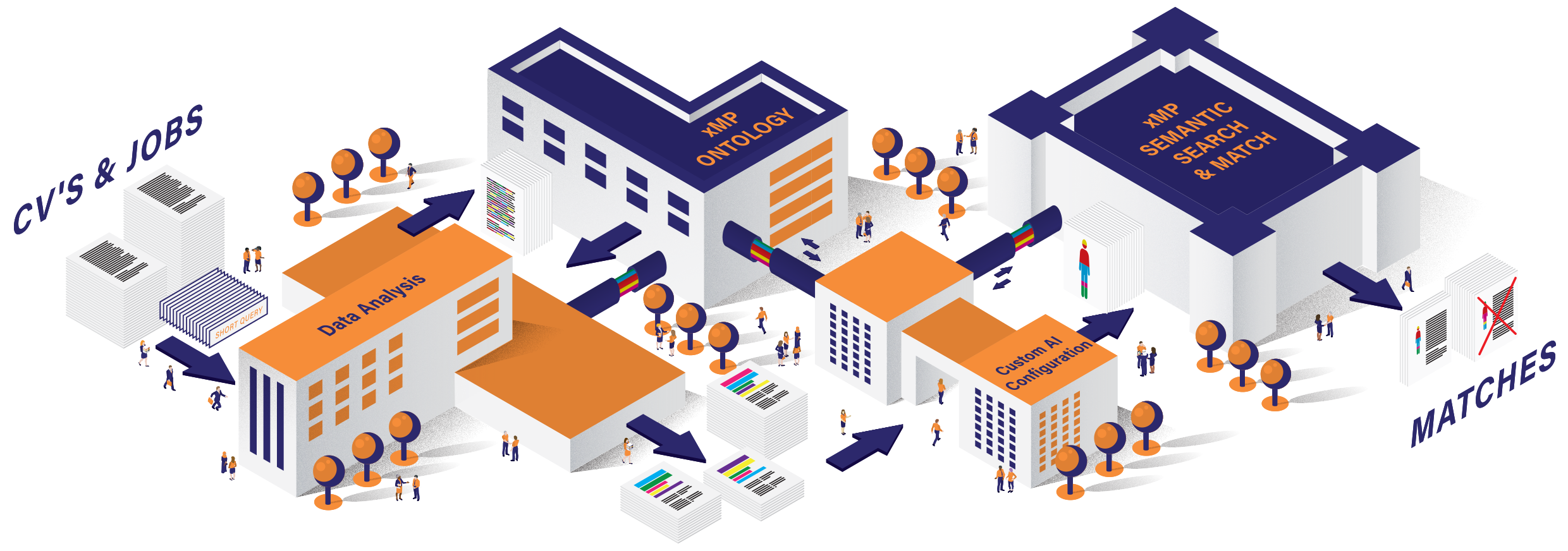Project Description

Ubeeo
Leon Buijsman, Founder/CEO
Wat do you do as a recruitment software developer if you have a fancy matching tool that nobody is using? Leon Buijsman, founder and CEO at Ubeeo, faced the problem and found the solution at Actonomy. ‘The power of Actonomy’s smart searching and selection tool is perfectly linked to the simple user interface of our own software.’ Read on to find out how both companies work together.
Ubeeo, formerly known as Hireserve, is a leading Dutch recruitment software development company. It develops easy-to-use software aiming at the corporate and public market, rather than focusing on recruitment companies. This focus on corporate clients, with their internal hiring managers, puts specific demands on the software developed: it should be stable and robust, but also simple and straightforward. Software may be complex in the background, but on the outside it should look attractive and easy to use.
One important element in recruitment software is the matching engine. Leon Buijsman, founder and CEO of Ubeeo: ‘We had close contacts with a couple of Actonomy’s competitors. But I didn’t really feel good vibes. It turned out we had to make too many parts ourselves. That felt uncomfortable.’
A train trip
Yet, the need was urgent. Ubeeo did already offer the possibility to automatically match, which sounds fine. ‘But’, Buijsman says, ‘it turned out that hardly any of our clients was using the matching option. Clearly, the option was hidden too far away in the software.’ So the question was: could there be a way to start the matching right away from the vacancy?
Then, some four years ago, Buijsman was on a Thalys train between Amsterdam and Brussel. A few seats away from him, he recognized a face and thought it was Filip De Geijter, founder/CEO at Actonomy, whom he met earlier. Buijsman laughs: ‘I sent him a LinkedIn invite, and immediately noticed him picking his phone and answering. So we met again.’
An important reason to start working with Actonomy clearly was the power of using synonyms. Buijsman: ‘If a company is looking for a ‘teacher’, Actonomy’s software will also match with ‘instructor’, ‘tutor’, ‘master’, etc. Another element Ubeeo found very attractive, was the possibility of matching straight away from the vacancy text. Buijsman: ‘Actonomy has a really good plugin for that, but Filip suggested us to build it right into our own software, rather than using a ready-to-use plug-in. Although this implied more work for both our and Actonomy’s engineers, the result is far better.
‘Now, the power and full complexity of Actonomy’s software is built in our easy-to-use recruitment software.’
The result, going live at Ubeeo’s clients in May 2021, is an obvious win-win. Not only is the matching option much more evident to find and use, but also does it deal with synonyms. And there is more. Buijsman: ‘We can also match on the basis of skills and competencies, as this is another typical strength of Actonomy’s technology.’
Unbiased
Matching is serious business. The match between Actonomy and Ubeeo is one made in heaven. ‘For matching, users expect what Google is offering them when searching the web: a simple interface and reliable results. Simplicity and reliability are quintessential to success. The partnership between Ubeeo and Actonomy is delivering on this promise.’
The two companies are about to further their cooperation. Buijsman explains: ‘Unbiased recruiting is trending. Actonomy’s matches are already multifaceted and unbiased. In our new project with Actonomy, we will objectivize soft skills in the searching and matching technology. That will be groundbreaking.’

Matching automatically, right away from the vacancy
Use the power of synonyms and get more relevant matches
Match on the basis of skills and competencies, not only titles
Multifaceted and unbiased matches
Solutions used by Amon

Actonomy xMP – Ultimate searching and matching
Actonomy xMP is based on human and artificial intelligence to mimic the quality of human recruiters, but do so on a much faster and accurate level than humans do. The technology is based on a deep understanding of how humans interpret meanings to a very deep level.
Automated semantic searching and matches does much more than matching words to one another: it matches the meaning of these words, as well as of the underlying concepts and contexts.
